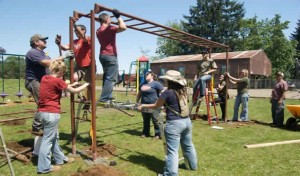4 Signs Your Church May Not Need Small Groups
When it comes to small groups, what works for big churches may not work for small churches.
Small group ministry is a must for a healthy church. We need the fellowship, the accountability and so much more.
But what if you can’t get small groups going strong in your small church, no matter how hard you try? Maybe you should stop trying. For a while, anyway.
I struggled for decades to do small groups in our church, with no success. We tried every small group method we could find. Sometimes they’d start strong, but they’d fade in a matter of months – a year at most.
So I gave them up.
For several years our church quit trying to do small group ministry. And it was one of the best decisions we ever made.
No more wasted energy, no more failed attempts and no more frustration trying to do something that wasn’t right for our church. Instead, we concentrated on ministries we could do well, until we were ready to try small groups again.
This is one area of ministry where what works for small churches is very different than what works for big churches.
Here are 4 signs your church may not need a small group ministry right now:
1. Your Small Church Is a Small Group
Big churches need small groups because of their size. The most personal, intimate aspects of our spiritual lives can’t thrive if we only have large meetings.
But many small churches don’t need small groups. They already are one. They just need to promote the intimacy of the small church experience.
2. If It Feels Divisive, It Is
When I arrived at my current church, the small, discouraged congregation was splintered into factions. Five pastorates in one decade will do that.
That divisiveness was evident on Sunday morning, when they set up too many chairs, arranged in four sections with massive aisles. The seating divided the 20-30 worshippers from each other.
On my second Sunday, I set up the half the chairs in three sections, featuring a center section where I encouraged everyone to gather. That started a healing process in the church.
They no longer felt separated because they no longer were separated.
Sometimes when we push people into small groups in a small church, we run the risk of doing what my church’s old seating arrangement did. Separating people who need to be gathered together.
3. You’re Only Doing It Because You’ve Been Told To
Ask yourself this question. If an expert hadn’t told you your church needs a small group ministry, would the need have been obvious?
Yes? Then proceed with small group ministry.
No? Then you probably don’t need one right now.
Those who told you small groups are essential for a healthy church were right. But that instruction was probably from a big church perspective and may not have taken into account that you’re doing the small stuff just fine.
4. There’s No Available Leadership
Is there someone in your church who has a heart, passion, drive, gifts and leadership skills to run a great small group ministry?
If so, train them and turn them loose. If not, don’t start a small group ministry hoping someone will step up and lead it. And don’t lead it yourself. Remember, you’re already leading a small group – your small church.
Great leaders don’t fit into existing ministries. Great ministries start with great leaders.
And here’s a final, hard-won word of advice – if you do start a group, put an expiration date on it. It can always be renewed. But if it fizzles out, it didn’t fail, it finished.
Try Ministry Teams, Instead
In big churches, small groups let members experience times of prayer, worship and fellowship they can’t get on Sunday. But people already get that on Sundays in a healthy small church. It’s probably one of the reasons they choose to attend a small church to begin with.
So let’s put our energy into something the congregation can’t get on Sundays.
Ministry Teams
No, not committees. Actual, working teams. (If you start a committee based on this post I’ll hunt you down and— give you the hug you obviously need).
Start a food pantry, an outreach, a prison visitation or anything else that meets these three criteria:
A NEED: No sense doing it if nobody needs it.
A LEADER: Someone with the passion and gift mix to head things up. Most of the time, they’re the one who raised the idea to begin with.
A TEAM: Don’t send a leader out alone. That’s not leadership. That’s burnout waiting to happen.
With those three, you’ll have Ministry Teams that will bless others, bless the participants and bless your church.
Plus, people who do ministry together tend to lean on God, his Word and each other for strength and accountability. And isn’t that what we want from our small groups?
___________________________________
First Published in Sermon Central.Com

